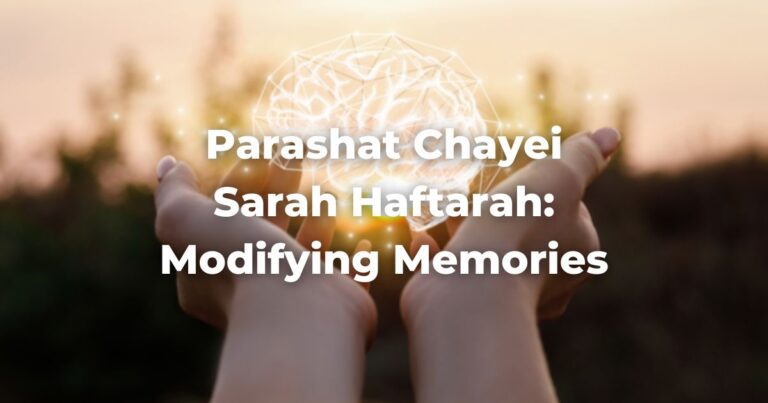Joseph is Still Alive
In parashat Vayigash the patriarch Jacob learns the truth about his son Joseph, whom he has not seen in several decades.
Joseph’s brothers return from Egypt to Canaan and inform their father, “Joseph is still alive, yes, he is a ruler over the whole land of Egypt” (Genesis 46:26).
At first Jacob does not believe his sons; the TorahRefers to the first five books of the Hebrew Bible, the Tanakh, also called the Five Books of Moses, Pentateuch or the Hebrew equivalent, Humash. This is also called the Written Torah. The term may also refer to teachings that expound on Jewish tradition. Read more teaches that his heart went numb in disbelief. The brothers keep trying to convince their father, telling him all that Joseph had recounted to them. Then Jacob sees the wagons that Joseph had sent him, and his spirit revives. “My son Joseph is still alive!” he declares. “I must go and see him before I die!” (Genesis 45:28).
Why does the sight of the wagons revive Jacob’s spirit when his sons’ words seem to have no effect? What do the laden wagons symbolize? What are these conveyances meant to convey?
The Midrash on laden wagons
According to the midrashThis word is used in two ways, as both a concept and a literature. As a concept, midrash is the expansive interpretation of biblical texts. The term is used to describe the practice of rabbinic interpretation. As a text, it refers to specific collections of interpretations, particularly from the third to ninth centuries in the Land of Israel and Babylonia. Plural: Midrashim
Read more, Jacob was never fully convinced that Joseph had died, which is why he refused to be consoled for the loss of his son (Genesis Rabbah 84:21).
But even so, when the brothers came to report that Joseph was alive and well in Egypt, Jacob discounted their words because it was they who had told him that Joseph had been torn apart by a wild beast (Genesis Rabbah 94:3). Nothing his sons say has any effect on him, because he has already dismissed them as unreliable narrators.
Then he sees the wagons, and something inside him shifts. His spirit is revived not because the wagons are proof that Joseph is still alive; he has always known that, at least on some level.
Rather, as the midrash teaches, the wagons are an important symbol for Jacob that his son is not just alive and well, but that the connection between them has remained strong in spite of their prolonged estrangement.
Perhaps when Jacob saw the wagons, he realized that his son still honored and respected him. Along with the wagons, Joseph had sent ten he-asses and ten she-asses laden with grain, bread, and provisions for his father on his journey to Egypt.
Upon seeing this gift, Jacob realized that Joseph had not forgotten the respect due to his father, in spite of becoming an important Egyptian dignitary.
Likewise Jacob understood that his son had not forgotten the values he had learned during the first seventeen years of his life in his father’s home, and he continued to act in accordance with those values, sending wagons so that his father might travel comfortably.
But did the laden wagons really come from Joseph?
The midrash notes that at first, the Torah described that the wagons were sent by Pharaoh (Genesis 45:21), and later they are described as sent by Joseph (Genesis 45:27).
Picking up on this textual inconsistency, the midrash teaches that when Pharaoh encouraged Joseph to send wagons to his father, he furnished Joseph with wagons covered in idolatrous symbols, like most of the royal conveyances in ancient Egypt. Judah burned those wagons, and Joseph then supplied new ones himself (Genesis Rabbah 94:4).
The wagons were thus a sign that in spite of his long sojourn in Pharaoh’s court, Joseph has not assimilated into the idolatrous Egyptian culture. He has remained devoted not just to his father, but also to his father’s God.
This revelation, too, revives Jacob’s spirit.
The laden wagons further symbolize Joseph’s enduring devotion to his father’s teachings.
The Hebrew word for “wagon”, agala, is similar to the Hebrew word for heifer, egel.
The richly-imaginative midrashic rabbis teach that at the time when Joseph was sold in slavery by his brothers, he and his father had been studying the laws of the egla arufa, described in Deuteronomy 21:1-9 (Genesis Rabbah 84:3, Genesis Rabbah 85:3).
These laws teach that if a dead body is found in a field and no one knows who killed him, then the elders of the nearest city must take a heifer and break its neck, and wash their hands while declaring “Our hands have not spilled this blood, nor have our eyes seen it done” (Deuteronomy 21:7).
Joseph sent the wagons as a sign to his father that he still remembered the Torah they had studied together—they were in the middle of studying the laws of the egla, and so Joseph sent agalot, reassuring his father that he had not forgotten their learning, and, presumably, that he was ready to resume.
But there is another level of significance to the particular laws that Jacob and his father were in the middle of studying, as Yakov Z. Mayer points out in his book Drishot (Yediot, 2009, untranslated). Jacob’s deepest fear was that his son had become like a dead body left in the field with no one to tend to him. He worried that his other sons had abandoned Joseph, and that there was no one to bring a heifer in atonement.
Moreover, he worried that he was implicated in Joseph’s tragic fate, because it was he who had sent Joseph off in search of his brothers on that fateful day when they threw him in the pit and pretended that the blood of an animal was in fact Joseph’s blood.
When Jacob sees the wagons, his spirit revives because he is finally reassured that he was not responsible for Joseph’s death; his hands had not spilled his blood.
And so the wagons are proof not just that the son has remained devoted to the father, but also that the father has not betrayed the son.
When Jacob sees the laden wagons, he realizes not just that his son is still alive, but that he still upholds the values with which he was raised.
Jacob’s realization is a reminder that generational distance may be not only physical, but also psychological; a parent may feel that a child has abandoned the values that parent sought to inculcate, or a child may feel that a parent has abdicated responsibility.
Perhaps there is no greater gift we can bestow upon our parents than the assurance that we, their children, remain committed to their values and will convey them—wagonload by wagonload—to the next generation.
See more: Parashat Vayigash
Originally posted as part of the Conservative Yeshiva at the Fuchsberg Jerusalem Center’s Torah Sparks. Support Torah learning from the Fuchsberg Jerusalem Center/Conservative Yeshiva for leaders and seekers around the world here.
Authors
-

Ilana Kurshan teaches TalmudReferring to one of two collections, the Jerusalem and Babylonian Talmuds, edited in the 6th century, that contains hundreds of years of commentary, discussion, and exploration of the ideas in the Mishnah. One could describe it as Mishnah + Gemara = Talmud Read more at the CY. She is the author of If All the Seas Were Ink (St. Martin’s Press, 2017) and Why is This Night Different From All Other Nights (Schocken, 2005). She has a degree in History of Science from Harvard and in English literature from Cambridge, and has worked in literary publishing both in New York and in Jerusalem – as a translator, a foreign rights agent, and as the Books Editor of Lilith Magazine. Since October 2020, Ilana has been a regular contributor to Torah Sparks, FJC’s weekly parashat hashavuah blog.
View all posts -



The Fuchsberg Jerusalem Center (FJC) is a home in the heart of Jerusalem where leaders and seekers can find an authentic place in Jewish tradition to call their own. FJC offers opportunities to study, pray and explore within an egalitarian and inclusive setting, creating multiple pathways for finding personal and communal meaning.
View all posts






